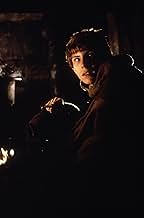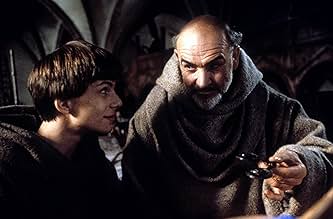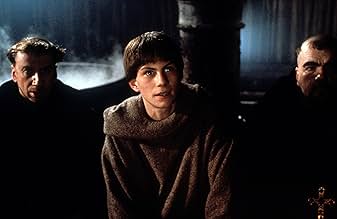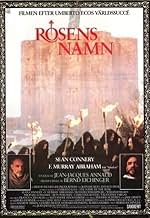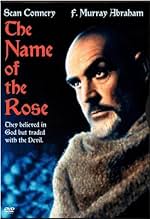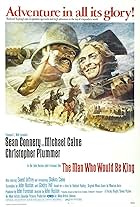An intellectually nonconformist friar investigates a series of mysterious deaths in an isolated abbey.An intellectually nonconformist friar investigates a series of mysterious deaths in an isolated abbey.An intellectually nonconformist friar investigates a series of mysterious deaths in an isolated abbey.
- Won 2 BAFTA Awards
- 17 wins & 6 nominations total
- Pietro d'Assisi
- (as Donal O'Brian)
Featured reviews
It's true that the film, directed by Jean-Jacques Annaud, has to skip, or skirt, much of Eco's detail - the famous pages-long description of the doorway, for example, is acknowledged by a few camera shots - but it takes the novel's literary strengths and offers a cinematic equivalent: a vivid depiction of monastic life which thrusts the viewer into the period of the story. In this respect, the production is exemplary: cinematographer Tonino Delli Colli, art director Dante Ferretti and composer James Horner were all operating at the top of their game.
And, as Renton in Trainspotting (1996) knows, Sean Connery proved a perfect choice as William of Baskerville, the 14th-century Sherlock Holmes figure investigating the deaths in an Italian monastery. It's one of Connery's best performances, a happy marriage of character acting and star casting: he suits the physical description of William and he properly conveys the character's wisdom, caution and sense of regret. Christian Slater's Adso, the narrator of the novel, is a surrogate for the viewer, expressing bafflement at the mystery story and awe at William's deductive powers; while F. Murray Abraham works wonders with the underwritten part of the inquisitor Bernardo Gui.
The Name of the Rose is one of the most underrated movies of the eighties. That it wasn't brilliant should not detract from the fact that it's as good as it is.
Enter Sean Connery playing a Sherlock Holmes (` Elementary my dear Wat-shun ') from the dark/middle ages, replete with a magnifying glass of sorts and a recognisable system of logical deduction. The story is a fine balance of complexity (easy enough to follow, but not too simplistic) with the inclusion of a number of sub-plots to keep it all ticking along nicely. The acting is very good but what makes it stand out is its evocation of another era, which is reproduced with authority. Highly enjoyable.
First of all the cast is pretty much perfect. Reading the book Sean Connery wasn't who I had in mind as the character but he certainly makes the character his own. His performance is for lack of a better word unique. He brings his usual indescribable something to the character which makes him almost instantly likable and believable. He delivers his lines in a confident manner that suits the character. Like in many other of his films his character is a teacher character but he does not seem to berate his pupil (Christian Slater) but allows him to grow on his own merely nudging him along. Even though not my first choice to have played the character I cannot find any other who would suit the part after seeing the film. Christian Slater plays the protagonist in what must be described as his break through character. His inexperience as an actor shows and once again suits the character who is also quite inexperienced in many ways. He portrays the change and ultimate conflicts of his character well enough and like Connery makes the character his own. Michael Lonsdale is pretty good as well and even though the character is not as well defined as in the book he provides the broad strokes in a satisfactory manner. Feodor Chaliapin Jr. does an excellent job in bringing Jorge to life and matches Connery's authority in their scenes together but once again the character is done in pretty broad strokes and you only get a small taste of what the character was like in the book. F. Murray Abraham's character is not like in the book and even though I was slightly disappointed by the film's portrayal of the character I understand why it was necessary to change the character for dramatic purposes. Ron Perlman who has since gone on to become quite a big star has a small role in this film and he does a decent job.
The film thrives on its complex story (which is nowhere near as complex as in the book) and deep characterization of the main characters who are about as defined as characters can become without internal monologue. There is voice-over by the older version of Christian Slater's character but is basically only used in the introduction and end part of the film and at a few crucial moments. The fantastic characterization is also helped by the incredibly sharp and well written dialog which never gets boring or forced like you could have feared given the religious content. In many scenes the dialog was in fact so good that I got the chills. The film focuses mainly on the mystery elements but the religious elements of the film are somehow weaved into the overall plot but there were plenty more of these religious elements and factors in the book. Overall I think the film should have been at least 15 minutes longer to get more of these elements in but maybe thats just me. However, all the most important plot points (and a few sub-plots) are covered so in that sense the film is successful.
Another thing that works very well is the atmosphere of the film which is very tense and mysterious. The tension is helped by the music which like so many other things in the film is quite unique and fitting. The set work is pretty simple but as it is a monastery you cannot expect the most flamboyant of sets. The sets work in their simplicity, however, and there is really no point of critique to be found in the set work. The lighting is kept at a minimum as well and once again this works in favor of the film as it adds to the overall tension. Sometimes the lighting is a little to dark but it happens so rarely that its not really a problem.
All in all Der Name der Rose (or The Name of the Rose) is a wonderful film but what drags the film down ever so slightly is that it can some times feel a little rushed because of the amount of material it is covering and there were a few elements from the book I would have liked to have seen in the film. In general, however, the cross from book to film is very well done and the overall plot is very well depicted with many tense, frightening and interesting moments. The film is definitely one of Connery's best and it is mainly because of his performance that I am giving the film a 9 in stead of an 8
9/10
Did you know
- TriviaSean Connery's career was at such a low point when he read for the role that Columbia Pictures refused to finance the movie when Jean-Jacques Annaud cast him as William von Baskerville.
- GoofsThe secret message on the parchment is exposed three times. The translator heated it to reveal the location of the library, William of Baskerville heated it again when he was in the scriptorium and yet again to show the others the message. When a message is written in lemon juice, heating it will cause it to become exposed because the sugar in the juice is caramelized and thus would not disappear again.
- Quotes
Adso of Melk: Master? Have you ever been in love?
William of Baskerville: In love? Yeah, many times.
Adso of Melk: You were?
William of Baskerville: Yes, of course. Aristotle, Ovid, Vergil...
Adso of Melk: No, no, no. I meant with a...
William of Baskerville: Oh. Ah. Are you not confusing love with lust?
Adso of Melk: Am I? I don't know. I want only her own good. I want her to be happy. I want to save her from her poverty.
William of Baskerville: Oh, dear.
Adso of Melk: Why "oh dear"?
William of Baskerville: You *are* in love.
Adso of Melk: Is that bad?
William of Baskerville: For a monk, it does present certain problems.
Adso of Melk: But doesn't St. Thomas Aquinas praise love above all other virtues?
William of Baskerville: Yes, the love of God, Adso. The love of God.
Adso of Melk: Oh... And the love of woman?
William of Baskerville: Of woman? Thomas Aquinas knew precious little, but the scriptures are very clear. Proverbs warns us, "Woman takes possession of a man's precious soul", while Ecclesiastes tells us, "More bitter than death is woman".
Adso of Melk: Yes, but what do you think, Master?
William of Baskerville: Well, of course I don't have the benefit of your experience, but I find it difficult to convince myself that God would have introduced such a foul being into creation without endowing her with *some* virtures. Hmm? How peaceful life would be without love, Adso, how safe, how tranquil, and how dull.
- Crazy creditsThe opening credits read - A palimpsest of Umberto Eco's Novel The Name of the Rose
- Alternate versionsCertain prints of the movie have the sex scene between Adso and The Girl removed in order to comply with local laws.
Details
- Release date
- Countries of origin
- Languages
- Also known as
- El nombre de la rosa
- Filming locations
- Kloster Eberbach, Eltville Am Rhein, Hessen, Germany(interiors: monastery church)
- Production companies
- See more company credits at IMDbPro
Box office
- Budget
- ITL 30,000,000,000 (estimated)
- Gross US & Canada
- $7,153,487
- Opening weekend US & Canada
- $494,571
- Sep 28, 1986
- Gross worldwide
- $7,153,487
- Runtime2 hours 10 minutes
- Color
- Aspect ratio
- 1.85 : 1
Contribute to this page


